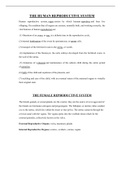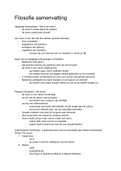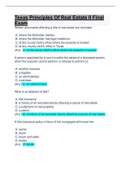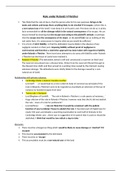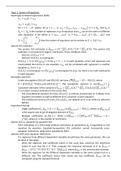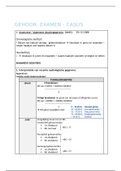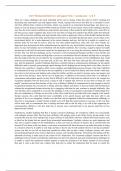BIOL FINAL
, THE CELL CYCLEO MITOSIS money novas
REPLICATE
-> The cell cycle of the cell mirrors the life cycle of
many organisms -> GROW, then
· The cell growth stage is also known as interphase
4 cells increase in size mitosis:
* duplicated chromosomes are separated into identical nuclei,
o
DUplicate DNA in prep for replication includes prophase, metaphase, anaphase & telophase
·
Replication has 2 parts: mitosis & Cytokinesis
-> The cell cycle is broken down into 4 'Phoses
3
· G1 pUOSe: GUppROse->GROWTH
·sphase: synthesis phase -> DNA synthesis All three included in interphase
·Gdphiose: growth, preparation for cell division
· MITOSIS & Cytokinesis
Mitoticphose
GLANCM Formation -> cells that are not supposed to divide pain will leavethe cell cycle,
Checkpoint ot 2 daughter
Mitosis
cells
↑
Cytokinesis and enter Gophase
This could be for short period of time (called puiescence), or it
could be permanent (called senescene
Interphase
-> GO is common in cells w/ more extreme characteristics when differen-
Interphase tilted (e.g. muscle, nerve, bone. We call this terminal differentication
->
eckpoint -> some cells enter Go as part of the ping process
-> the phases of mitosis
-> Replicated, HOMOLOGOLIS chromosomes as viewed by electron microscopy
·Homolopons: some genes in some order, DLITDNA sequence is not identical
MITOSIS IS THE FINAL STAGE OF THE CELL CYCLE IM- PHASE AND INCLUDES CYTORINESIS
-> Mitosis creates identical clones of parent cells
* In mitosis It is the sister chromatids that are separated
*
The difference between mitosis and cytokinesis is that mitosis is the separation of the DNA, Cytokinesis is the division
of the rest of the A
cytoplasm
-> Nondisconjunction during mitosis
o improper release from the miotic spindle will result in improper separation of chromosomes. This is called nondisconjuns.
it is usually fatal to both cells. However it should have minimal impact on a multicellular organism.
-> Explain the difference btwn a chromatic and a chromosome and how their levels in the cell change throughout the cell
cycle. Relate this to the amount of DNA in the cell each stage.
· Replication in s-phase doubles the amount of DNA WITHOUT Changing the ploidy level or number of chromosomes. Sister
chromatics are formed, and then split apart during mitosis
-> THE STEPS OF MITOSIS - >CYTOKINESIS
METAPHASETANAPHASE
-
T
T
PROPHASE C TELOPHASE
->
a prometaphase
PROPHASE
· In early prophase, the cell starts to break down some structures and build others up, setting the stage for division of the chromosomes.
The chromosomes start to condense (making them elisier to PUIICPPrt later on
-> The miotic spindle begins to form. Its job is to organize the chromosomes to more them around during mitosis
-> The nucleolus dissappears. This is a sign that the nucleus is getting ready to break down.
·in 1Cte prophase (sometimes called prometaphase), the mitotic spindle begins to capture and organize chromosomes
-> The chromosomes become even more condensed, so they are very compact
->
The nuclear envelope breaks down, releasing the chromosomes
-> The mitotic spindle grows more, and some of the microtubules start to "capture" chromosomes.
-> The condensation of chromosomes (becomes visible) // nucleolus dissapears
-> Mitotic spindle microtubules attatch to kinetochores
·in metaphase, the spindle has captured all the chromosomes and lined them up at the middle of the cell, ready to divide
-> All the chromosomes align at the metaphase plate, 2 pinetochores of each chromosome should be attatched to the
microtubules of opposite spindle poles
, THE CELL CYCLEO MITOSIS money novas
REPLICATE
-> The cell cycle of the cell mirrors the life cycle of
many organisms -> GROW, then
· The cell growth stage is also known as interphase
4 cells increase in size mitosis:
* duplicated chromosomes are separated into identical nuclei,
o
DUplicate DNA in prep for replication includes prophase, metaphase, anaphase & telophase
·
Replication has 2 parts: mitosis & Cytokinesis
-> The cell cycle is broken down into 4 'Phoses
3
· G1 pUOSe: GUppROse->GROWTH
·sphase: synthesis phase -> DNA synthesis All three included in interphase
·Gdphiose: growth, preparation for cell division
· MITOSIS & Cytokinesis
Mitoticphose
GLANCM Formation -> cells that are not supposed to divide pain will leavethe cell cycle,
Checkpoint ot 2 daughter
Mitosis
cells
↑
Cytokinesis and enter Gophase
This could be for short period of time (called puiescence), or it
could be permanent (called senescene
Interphase
-> GO is common in cells w/ more extreme characteristics when differen-
Interphase tilted (e.g. muscle, nerve, bone. We call this terminal differentication
->
eckpoint -> some cells enter Go as part of the ping process
-> the phases of mitosis
-> Replicated, HOMOLOGOLIS chromosomes as viewed by electron microscopy
·Homolopons: some genes in some order, DLITDNA sequence is not identical
MITOSIS IS THE FINAL STAGE OF THE CELL CYCLE IM- PHASE AND INCLUDES CYTORINESIS
-> Mitosis creates identical clones of parent cells
* In mitosis It is the sister chromatids that are separated
*
The difference between mitosis and cytokinesis is that mitosis is the separation of the DNA, Cytokinesis is the division
of the rest of the A
cytoplasm
-> Nondisconjunction during mitosis
o improper release from the miotic spindle will result in improper separation of chromosomes. This is called nondisconjuns.
it is usually fatal to both cells. However it should have minimal impact on a multicellular organism.
-> Explain the difference btwn a chromatic and a chromosome and how their levels in the cell change throughout the cell
cycle. Relate this to the amount of DNA in the cell each stage.
· Replication in s-phase doubles the amount of DNA WITHOUT Changing the ploidy level or number of chromosomes. Sister
chromatics are formed, and then split apart during mitosis
-> THE STEPS OF MITOSIS - >CYTOKINESIS
METAPHASETANAPHASE
-
T
T
PROPHASE C TELOPHASE
->
a prometaphase
PROPHASE
· In early prophase, the cell starts to break down some structures and build others up, setting the stage for division of the chromosomes.
The chromosomes start to condense (making them elisier to PUIICPPrt later on
-> The miotic spindle begins to form. Its job is to organize the chromosomes to more them around during mitosis
-> The nucleolus dissappears. This is a sign that the nucleus is getting ready to break down.
·in 1Cte prophase (sometimes called prometaphase), the mitotic spindle begins to capture and organize chromosomes
-> The chromosomes become even more condensed, so they are very compact
->
The nuclear envelope breaks down, releasing the chromosomes
-> The mitotic spindle grows more, and some of the microtubules start to "capture" chromosomes.
-> The condensation of chromosomes (becomes visible) // nucleolus dissapears
-> Mitotic spindle microtubules attatch to kinetochores
·in metaphase, the spindle has captured all the chromosomes and lined them up at the middle of the cell, ready to divide
-> All the chromosomes align at the metaphase plate, 2 pinetochores of each chromosome should be attatched to the
microtubules of opposite spindle poles


